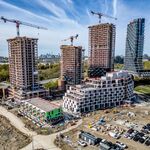Towered
Senior Member
If you really believe that:
A) $170 million per year is a piddly amount, or;
B) the difference between $170 million and $200 million is the difference between "setting back transit a good decade" and not setting back transit a decade, or;
C) 170 is half of 200
...then you're being wilfully ignorant.
And that's not even taking into account the latter half of your argument, which is just bizarre; you don't like the premier because you (wrongly) accuse her of shirking transit but then acknowledge that one of her transit pledges would be canceled by her replacement?
And all of that doesn't even take into account the fact that, under the tolls plan, a (legitimately) piddly amount would actually be dedicated to transit (hello, Gardiner East rebuild). Which has nothing to do with transit.
The number that's been mentioned in the media has been up to 300 million a year from the tolls. You can find quotes from the city manager complaining that Wynne's proposed doubling of gas tax revenues won't even come close to that amount, because 170 is a bit more than half of 300, therefore piddly in comparison. Good luck getting the desperately needed DRL built with that.
And if you think a premier that has consistently polled between 10 and 15% approval has a shot at winning an election just over a year from now, then you're being wilfully ignorant, not me. Even more so if you think the PC's will honour that pledge.




